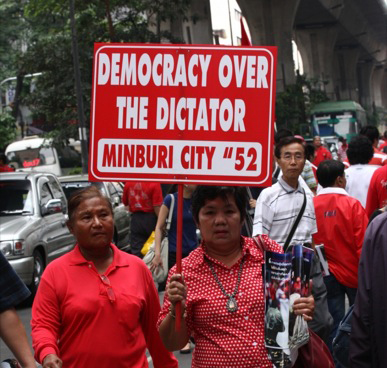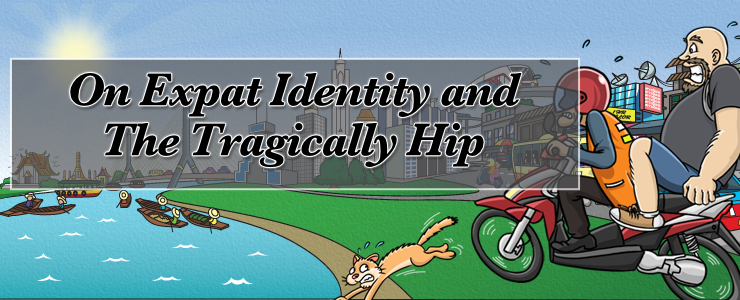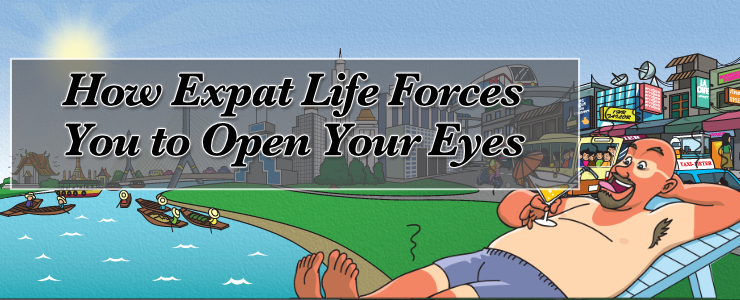The current unrest in Egypt is making a lot of people nervous, and rightfully so. The one phrase that I keep coming back to is from Alan Moore’s badass comic book V for Vendetta: People shouldn’t be afraid of their government. Governments should be afraid of their people. It’s a simple statement, but it carries a lot of weight. But as I took in what’s happening in Egypt and compared it with my experiences with Thailand’s recent unrest over the past year, I got to thinking about how context and relativity plays a role in examining just how bad one actually has it, or how serious a situation really is.
I remember seeing a lot of protest signs during the red shirt riots last April and May (I was usually only able to read the ones in English, as my knowledge of violent protest vocabulary is a bit thin) and a few stuck with me. One of these was something to the effect that members of the government were ‘dictators’, ‘terrorists’ and ‘tyrants’.

Jerk? Maybe. Dictator? Yeah… probably not.
I remember thinking this was a bit of a stretch. Say what you will about the current government – call them heroes or assholes; thieves or saviours; selfish or generous. Whatever you think they are, the one thing they are not is dictators, terrorists or tyrants.
Like most things, it’s hard to really get an understanding of something until you really compare it with similar somethings around the world. For instance, it’s pretty easy to complain about many aspects of Thailand – the sidewalks suck, the tuk-tuk drivers are scam artists, the politicians are corrupt, etc. But I’ll tell you what – after a week in India, coming back to Thailand is like coming back to Singapore. Many Indians dream of a country that’s as well organized, sparklingly clean and hyper-efficient as Thailand is in comparison.
So, when you consider what’s happening in Egypt and many other countries – where police torture, kidnappings, corruption, poverty and the class-divide are far more common and pronounced than they are in Thailand – ‘tyrant’ might be the wrong noun to use in Thailand. Stalin was a tyrant. Kim Jong Il is a dictator. Timothy McVeigh was a douchebag and a terrorist. And in terms of Thailand, I’m not defending or deriding the passion or sacrifie of either side; I’m merely saying that in any heated situation with high stakes, maintaining perspective is never a bad thing.

Maybe a bit more perspective is needed.
One other aspect of all of this that I found interesting were some of the rumblings over the past few days akin to “Why didn’t the red shirt protests take on the same scale as the ones in Egypt?” Well, I’m clearly no policy expert or political scientist, but it seems to me that while the red shirts (and yellow shirts, for that matter) represent(ed) a good-sized chunk of the Thai population, the Egyptian protesters seem to represent almost the entire nation.
I brought this up with a friend of mine and he said that perhaps the fracturing of certain elements of Thai society might actually be preventing things from getting worse. If a movement lacks sufficient mass to really gain momentum, it will quickly die out, and perhaps there are simply too many people with too many vested interests in Thailand for a real movement to begin.
An Egyptian friend of mine who lives here has not been able to contact his ex-wife or daughter back in Cairo since the trouble started, yet posted this on his Facebook wall:
Many have expressed concern about the uncertainty of new leadership in Egypt. Let me be clear: between the current regime and uncertainty, I choose uncertainty.
Let’s hope justice prevails in Egypt – indeed, in any area where it’s needed – and that we learn to solve our problems with our heads and hearts, not guns and tanks.
What do you think?





Great points. I'm from India. When i first went to Thailand. I thought it to be just another third world country. Then as soon as i landed at suvernabumi. I was like what just happened..I was supposed to be in a third world country…From the airport to my stay in Thailand. I was in amazement at the efficiency of Thai people compared to what we have back home.
My friends all say the same thing, It will take India another 100 years to be as efficient as Thailand. Thailand and Malaysia are put in wrong category, it should be changed from developing country to getting developed status. Its not a third world country by any means.
We have a so called fledging democracy and look where it has landed us. I would never think Democracy is the answer to economic problems having born and lived in India. Thanks
Thanks Jack. I should have been more clear that I wasn't knocking India. I LOVE India in all its awful glory, but it sure is overwhelming, and coming back to even a halfway-organized country like Thailand is a breath of fresh air. It's like holding two baseball bats for practice, and then suddenly switching to one. 🙂
If Thailand's not a dictatorship, why do you have to have this:
"Comment Moderation Enabled
Thanks for the comment! However, this being Thailand and all, I have to approve it first before automatically putting it up. Wouldn't want to make THE MAN angry!"
Ooh, good question DC, that does raise some interesting points. This might be splitting hairs a bit, but 'Dictatorship' as defined in the dictionary (A form of government in which the ruler is an absolute dictator (not restricted by a constitution, laws or opposition etc.)) seems to me to be a different beast than me feeling the need to use caution. Even if this caution is based on a fear of outdated, absurd, and archaic laws, I think it's different. While I am not legally bound to enable filtering on comments, the very fact that I feel it's safer certainly says a lot about the issue on its own.
And you believe the military in Thailand feels "restricted by a constitution, laws or opposition"?